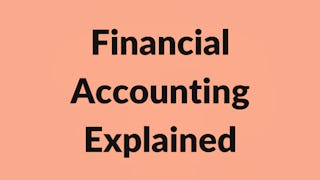This course, developed at the Darden School of Business at the University of Virginia and taught by top-ranked faculty, will teach you the tools you'll need to understand the fundamentals of financial accounting. Concise videos, the financial records of a small business, and "your turn" activities guide you through the three most commonly used financial statements: the Balance Sheet, the Income Statement, and the Statement of Cash Flows. Beyond recording transactions, you'll learn how to prepare these financial statements, and read and analyze them to draw basic conclusions about a company's financial health.

Early bird sale! Unlock 10,000+ courses from Google, IBM, and more for 50% off. Save today.


Financial Accounting Fundamentals
This course is part of Entrepreneurship: Growing Your Business Specialization

Instructor: Luann J. Lynch
170,590 already enrolled
Included with 
(2,764 reviews)
Recommended experience
What you'll learn
How to use journal entries to record transactions and prepare and use t-accounts to summarize transactions recorded during an accounting period
The three most commonly used financial statements and how they fit together
How to prepare these financial statements based on transactions recorded during an accounting period
How to draw basic conclusions about a company's financial health
Skills you'll gain
Details to know

Add to your LinkedIn profile
10 assignments
See how employees at top companies are mastering in-demand skills

Build your subject-matter expertise
- Learn new concepts from industry experts
- Gain a foundational understanding of a subject or tool
- Develop job-relevant skills with hands-on projects
- Earn a shareable career certificate

There are 5 modules in this course
During this first week, we’ll learn about the context for financial accounting, including the informational role it plays for both internal and external audiences. We’ll explain accounting standards, which ensure financial information is conveyed clearly and effectively. Finally, we’ll describe the three primary financial statements as part of a recurring accounting process, called the accounting cycle, and then dive into one of those statements: the Balance Sheet (BS).
What's included
14 videos2 readings2 assignments
After learning about the Balance Sheet, we’re ready to move on to using journal entries to record transactions, then t-accounts to summarize transactions recorded during an accounting period. We’ll apply those tools to record transactions for a fictional startup company, The Garden Spot, during its first year of operations (TGS Year 1). As we go along, we’ll also evaluate the effect of transactions on the balance sheet equation to ensure it remains balanced.
What's included
13 videos2 assignments
Now that we’ve learned the fundamentals of recording transactions, we’re ready to dive into another financial statement: the Income Statement (IS). After learning about the Income Statement, we’ll record revenue and expense transactions, and summarize these transactions in a special account. Finally, we'll record adjusting entries in accordance with accrual accounting, prior to the preparation of the financial statements.
What's included
14 videos2 assignments
After learning about the Income Statement, revenue and expense transactions, and adjusting entries, we’re ready to move on to preparing our end-of-period financial statements. We’ll prepare the Income Statement and Balance Sheet based on the transactions that have been recorded. Then, we’ll dive into the Statement of Cash Flows (SCF) and learn how to prepare that financial statement. Finally, we’ll briefly discuss closing entries, since we've been preparing them as we've been going along!
What's included
16 videos2 assignments
During this last week, we’ll walk through the second year of operations for our fictional startup company, The Garden Spot (TGS Year 2), for additional practice recording transactions and preparing our end-of-period financial statements. Then, we’ll do some analysis of The Garden Spot’s financial statements. Finally, we’ll take a look at PepsiCo’s Annual Report as an example of reporting for a publicly traded U.S. company.
What's included
16 videos2 assignments
Earn a career certificate
Add this credential to your LinkedIn profile, resume, or CV. Share it on social media and in your performance review.
Instructor

Offered by
Explore more from Business Essentials
 Status: Free Trial
Status: Free Trial
Corporate Finance Institute


Politecnico di Milano


Coursera Project Network
 Status: Free Trial
Status: Free Trial
Fundação Instituto de Administração
Why people choose Coursera for their career




Learner reviews
2,764 reviews
- 5 stars
85.56%
- 4 stars
12.51%
- 3 stars
1.15%
- 2 stars
0.39%
- 1 star
0.36%
Showing 3 of 2764
Reviewed on Nov 25, 2020
Great lectures! My only feedback is that I think I would've really benefitted from some study alone worksheets personally as an appendices to the course so I could practice.
Reviewed on Aug 1, 2020
Excellent way of teaching by the professor.Excellent course . I learnt all the basic terminologies related to finance.Luyaan's pedagogy is classic and very explicable...thank you coursera
Reviewed on Sep 4, 2020
The concepts learned during this course made possible for me to present the project financials in a better way to the director. This course should be a must for all of us in the project management.

Open new doors with Coursera Plus
Unlimited access to 10,000+ world-class courses, hands-on projects, and job-ready certificate programs - all included in your subscription
Advance your career with an online degree
Earn a degree from world-class universities - 100% online
Join over 3,400 global companies that choose Coursera for Business
Upskill your employees to excel in the digital economy
Frequently asked questions
Access to lectures and assignments depends on your type of enrollment. If you take a course in audit mode, you will be able to see most course materials for free. To access graded assignments and to earn a Certificate, you will need to purchase the Certificate experience, during or after your audit. If you don't see the audit option:
The course may not offer an audit option. You can try a Free Trial instead, or apply for Financial Aid.
The course may offer 'Full Course, No Certificate' instead. This option lets you see all course materials, submit required assessments, and get a final grade. This also means that you will not be able to purchase a Certificate experience.
When you enroll in the course, you get access to all of the courses in the Specialization, and you earn a certificate when you complete the work. Your electronic Certificate will be added to your Accomplishments page - from there, you can print your Certificate or add it to your LinkedIn profile. If you only want to read and view the course content, you can audit the course for free.
If you subscribed, you get a 7-day free trial during which you can cancel at no penalty. After that, we don’t give refunds, but you can cancel your subscription at any time. See our full refund policy.
More questions
Financial aid available,

